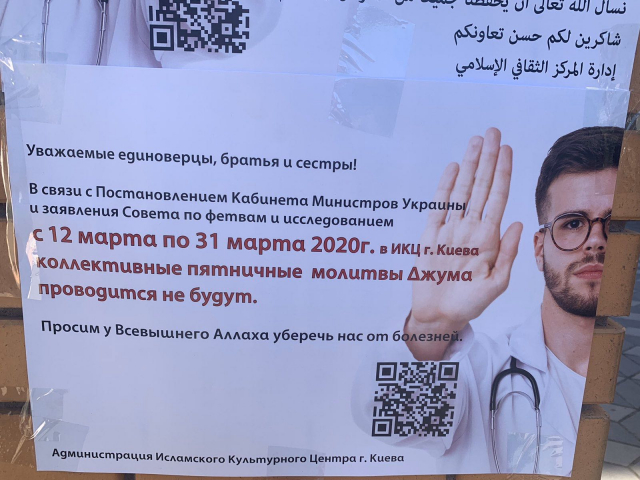Coronavirus pandemic and respective quarantine touched most regions of the world, including basically every European country. COVID-19 not only became a challenge for national economies, international corporations, companies, politicians and diplomats, but accentualized a range of matters of morality and ethics.
Necessity for observance of strict quarantine regulations exacts a toll on social organisations, especially large religious institutions.
The Christians, for instance, debate the possibility of suspending communion, which is one of the basic rituals of Christianity.
Muslims faced a similar dilemma. After quarantine was enforced, first in Kyiv and later in the regions, the reaction of the largest Muslim unions of the county was different.
Religious Administration of Muslims of Ukraine “Umma” (Mufti Said Ismagilov) held an urgent session of the Ukrainian Council for Fatwa and Research for developing recommendations for the time of quarantine. They produced a fatwa (legal opinion on a point of Islamic law) where they recommended Muslims to meticulously follow quarantine and avoid public gatherings, including the ones for Friday prayers. Instead they offered the believers to pray at home, as consistent with Prophet Muhammad’s practice.
On the very next day, 13 March, Sheikh Said Ismagilov said in his video message that Friday prayers were suspended at all the RAMU “Umma” mosques until the quarantine was over. However, after Verkhovna Rada passed a law on measures of COVID-19 control, the Administration cancelled all the classes and events, which includes closing the mosques in large cities.
Association on Muslims of Ukraine (headed by Suleiman Hairullaev) and affiliated Religious Administration of Muslims of the Autonomous Republic of Crimea (RAMARC, Mufti Aider Rustemov) at first announced that they were planning to proceed with the prayers, but shorten the time of Friday preaching and take additional preventive measures. However, in just 4 days (16 March) the RAMARC Ulama Council announced suspending Friday preaching and prayers for an indefinite term, “until the situation improves” (as declared in the document). At the same time, it says nothing about suspending everyday prayers at RAMARC mosques and prayer rooms.
On 17 March, Head of Civil Society Union “All-Ukrainian Association Alraid” Seyran Aryfov also announced suspending all events at their Islamic Cultural Centres for the duration of the quarantine. He called upon the Ukrainians to keep calm, take precaution, and take care of both their own and their close ones’ health.
The Religious Administration of Muslims of Ukraine (Mufti Ahmed Tamim) chose not to suspend Friday and regular prayers despite the enforced quarantine. On their website, they published the administration's decision on the rules and precautions to be observed during quarantine in order to prevent spreading the COVID-19. To name a few, it says that regular prayers must be performed “in groups up to 10 people, with proper distance”. The RAMU also suspended women, children, elderly people, people with chronic health issues and travellers from attending their mosques and prayer rooms.
Yet despite suspending mass events and even prayers at mosques, Muslim volunteers go on with ther social and community service. In Zaporizhzhia, Muslimahs from “Safiya” organisation along with the local Muslim community organized charitable delivery of grocery packs to needy people. According to Imam Muhammad Mamutov, they are planning to proceed with the benefit and deliver the grocery packs, first of all, to people of age or with chronic health issues.
Severodonetsk Muslim community “Bismillah” (Imam Temur Beridze) joined the all-Ukrainian ecology benefit “A Million Trees”, having planted 1200 nurselings in their city. Besides, many Imams of RAMU “Umma” took the communication with their parishioners to the social media, where they post filmed lectures and lessons, supporting and educating the believers and thus proceeding with their religious service.


